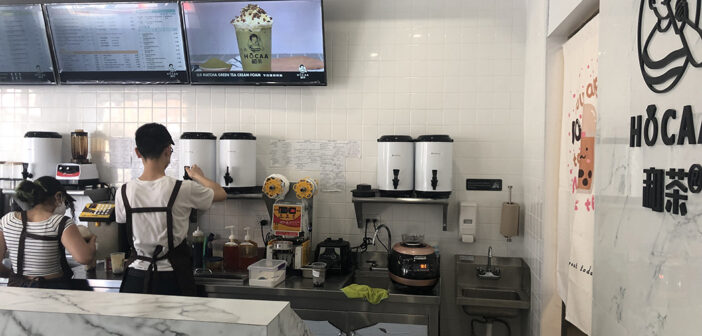Tony Cheng, manager and co-owner of Hocaa Bubble Tea, began hanging help-wanted posters in the windows of his establishment in May. At the time, Hocaa Bubble Tea had just opened in South Bethlehem and was in desperate need of employees.
Fast forward to today, Cheng still puts up posters in hopes of attracting potential new hires.
He’s not alone in these labor-related struggles: a National Federation of Independent Business Small Business Economics Trends survey from May found that 48 percent of small businesses were reporting open job positions—the highest percentage in 47 years.
Over 60 percent of businesses reported labor shortages, some of them labeling it as “critical.”
For Cheng and Hocaa Bubble Tea, this economic trend often meant increasing wages up to $15 per hour—including tips—just to attract potential employees.
Cheng said that himself as well as his friends in restaurant managerial positions have had to work overtime when increased wages and reduced hours aren’t enough to attract more workers.
“I had to close Hocaa three times because nobody wanted to work or couldn’t work,” Cheng said. “A lot of days I have to work from open to close which is very tiring.”
Cheng thinks people don’t have enough incentive to work amidst the pandemic and the unemployment benefits that have come with it. Forbes reported an increase of 12 million people receiving unemployment benefits during the pandemic.
“For-hire” signs can also be seen at Dinky’s Bethlehem Ice Cream Parlor and Grill, as well as on their social media pages. Dinky’s co-owner Jill Matthews finds that the COVID-19 related unemployment benefits have fostered a sense of inaction among potential employees, causing the restaurant to face no-shows with interviewees and even sometimes after people are hired.
“We’re a family-run business,” Matthews said. “We just can’t compete with what unemployment pays people. It’s ridiculous.”
Despite this, Matthews said with schools starting up again, the number of people, specifically students, that are willing to work has increased.
However, this doesn’t completely resolve the problem.
Matthews said the impact labor shortages have had on supply chains is a big domino effect. To her, supplies and workers aren’t always there to get products where they need to be.
Co-owner of Roasted Bethlehem, Derek Wallen, said in an email that his business has been short-staffed with limited hours and product due to rising prices—a common situation for local business at this stage in the pandemic where consumer demand has returned but labor shortages persist.
Many small business managers are strategizing to improve relations between employee and employer in the hiring process, as part of an effort to prevent further damage.
Robert van Thiel, director of front of house operations at Molinari’s Italian restaurant, has been with the establishment for about seven years but sees the restaurant in a new light following COVID-19 related economic trends.
Molinari’s was forced to close in March 2020 at the onset of the pandemic, laying off most of its staff, van Thiel said.
Once they returned to work, they were working with a staff of about four, mostly management, dealing directly with takeout orders only three days a week.
Van Thiel said he and his coworkers understood a business shift should be made after dealing with no-show interviewees and tight restrictions. To him, people still wanted to work but couldn’t handle the newfound slowness of the hospitality industry.
“We personally know that people that have left our business, left the hospitality industry as a whole, being that it was always pitted as the business that never stops,” van Thiel said. “That ethos is kind of shattered with COVID.”
Van Thiel said Molinari’s increased wages with the intention of hiring fewer employees and has been slower to maintain a level of quality service and product.
To van Thiel, there’s been a shift in how managers should handle their restaurants: he said it’s all about thinking realistically.
“We’re reinventing the wheel in reference to no one in this lifetime experiencing this shortage of labor,” van Thiel said. “We’re being cognisant of our most important resource which is our time.”






Comment policy
Comments posted to The Brown and White website are reviewed by a moderator before being approved. Incendiary speech or harassing language, including comments targeted at individuals, may be deemed unacceptable and not published. Spam and other soliciting will also be declined.
The Brown and White also reserves the right to not publish entirely anonymous comments.